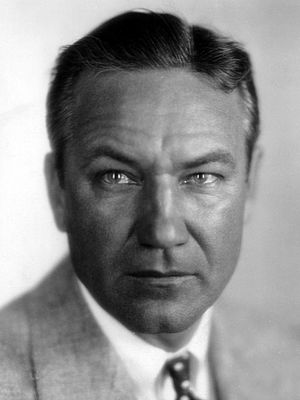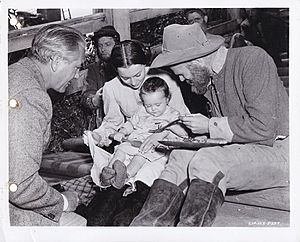Victor Fleming facts for kids
Quick facts for kids
Victor Fleming
|
|
|---|---|

Fleming in 1927
|
|
| Born |
Victor Lonzo Fleming
February 23, 1889 |
| Died | January 6, 1949 (aged 59) Cottonwood, Arizona, U.S.
|
| Resting place | Hollywood Forever Cemetery |
| Occupation |
|
| Years active | 1910–1949 |
| Known for |
|
| Spouse(s) | Lucile Rosson (1933–1949) |
Victor Lonzo Fleming (born February 23, 1889 – died January 6, 1949) was an American film director, camera expert, and producer. He is best known for directing two very famous movies from 1939: Gone with the Wind and The Wizard of Oz.
For Gone with the Wind, he won an Academy Award for Best Director. Both of these films are listed among the top 10 movies of all time by the American Film Institute.
Contents
Victor Fleming's Life and Career
Early Life and First Jobs
Victor Fleming was born on February 23, 1889. His family lived on the Banbury Ranch in La Cañada Flintridge, California. His parents were Eva and William Richard Lonzo Fleming.
Victor was good with machines from a young age. He first worked as a car mechanic. There, he met a film director named Allan Dwan. Dwan saw Victor's talent and hired him as a camera assistant.
Becoming a Film Expert
Victor quickly learned about cameras and filming. He became a cinematographer, which means he was in charge of the cameras and lighting for movies. He worked with famous directors like Allan Dwan and D. W. Griffith. In 1919, he directed his very first film.
During World War I, Victor Fleming worked for the United States Army. He was part of the photography team. He even became the main photographer for President Woodrow Wilson in France. After the war, he taught at Columbia University. He led a school where he trained over 700 soldiers to make films.
Directing Style and Famous Actors
Many of Victor Fleming's early films were action movies. He often worked with actor Douglas Fairbanks. He also directed many Westerns. Because he loved outdoor sports, people called him a "man's director." But he was also very good at directing women.
Under his direction, actresses won important awards:
- Vivien Leigh won the Academy Award for Best Actress for Gone with the Wind.
- Hattie McDaniel won the Academy Award for Best Supporting Actress for Gone with the Wind.
- Olivia de Havilland was also nominated for an Oscar for her role in Gone with the Wind.
Another camera expert, Archie Stout, said that Fleming knew the most about camera angles and lenses. Actor Van Johnson remembered Fleming as a great director, but also a "tough man" to work with.
Working at MGM Studios
In 1932, Victor Fleming joined MGM. This was one of the biggest film studios. He directed many important movies for them.
Some of his films at MGM include:
- Red Dust (1932)
- Bombshell (1933)
- Reckless (1935)
These films often starred the famous actress Jean Harlow.
He also directed adventure stories based on books:
- Treasure Island (1934) with Wallace Beery.
- Captains Courageous (1937) with Spencer Tracy. Spencer Tracy won his first Oscar for this movie.
His two most famous movies came out in 1939: The Wizard of Oz and Gone with the Wind.
Fleming directed Spencer Tracy in other films too, like A Guy Named Joe and Test Pilot. He also worked with Clark Gable in five movies, including Red Dust and Gone with the Wind.
Personal Life and Final Film
Victor Fleming owned a large horse ranch in Bel Air, Los Angeles, California. Many famous actors like Clark Gable, Vivien Leigh, Ingrid Bergman, and Spencer Tracy often visited his home.
Victor Fleming died on January 6, 1949. He had a heart attack while on his way to a hospital in Cottonwood, Arizona. He had just finished directing his last film, Joan of Arc (1948). This movie starred Ingrid Bergman. It was one of the few films he made that was not for MGM. Joan of Arc received seven Oscar nominations and won two.
Political Views Discussion
Some people have discussed Victor Fleming's political views during World War II. A writer named James Curtis wrote in a book that actress Anne Revere once said Fleming was strongly against the United States joining World War II. Another book, Victor Fleming: An American Movie Master by Michael Sragow, mentions that Fleming once made a bet about how long the UK could last against Germany.
However, the accuracy of Revere's statement has been questioned. The book by Michael Sragow explains that Revere might have made the comment because she felt she got a role over a British actress. But at that time, Fleming was working on a film with many British actors and a British producer. Also, Revere did not know Fleming very well outside of work.
Victor Fleming's Filmography

- The Half-Breed (1916)
- When the Clouds Roll By (1919) (first film as director)
- The Mollycoddle (1920)
- Mama's Affair (1921)
- Woman's Place (1921)
- The Lane That Had No Turning (1922)
- Red Hot Romance (1922)
- Anna Ascends (1922)
- Dark Secrets (1923)
- Law of the Lawless (1923)
- To the Last Man (1923)
- The Call of the Canyon (1923)
- Empty Hands (1924)
- Code of the Sea (1924)
- Adventure (1925)
- The Devil's Cargo (1925)
- A Son of His Father (1925)
- Lord Jim (1925)
- The Blind Goddess (1926)
- Mantrap (1926)
- The Way of All Flesh (1927)
- Hula (1927)
- The Rough Riders (1927)
- The Awakening (1928)
- Abie's Irish Rose (1928)
- Wolf Song (1929)
- The Virginian (1929)
- Common Clay (1930)
- Renegades (1930)
- Around the World in 80 Minutes with Douglas Fairbanks (1931)
- The Wet Parade (1932)
- Red Dust (1932)
- The White Sister (1933)
- Bombshell (1933)
- Treasure Island (1934)
- Reckless (1935)
- The Farmer Takes a Wife (1935)
- Captains Courageous (1937)
- Test Pilot (1938)
- The Wizard of Oz (1939)
- Gone with the Wind (1939)
- Dr. Jekyll and Mr. Hyde (1941)
- Tortilla Flat (1942)
- A Guy Named Joe (1943)
- Adventure (1945)
- Joan of Arc (1948) (final film)
Images for kids
See also
 In Spanish: Victor Fleming para niños
In Spanish: Victor Fleming para niños
 | Shirley Ann Jackson |
 | Garett Morgan |
 | J. Ernest Wilkins Jr. |
 | Elijah McCoy |


